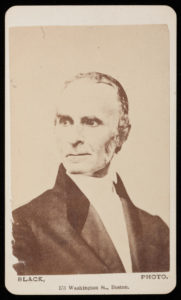 Sarah Orne Jewett House
Sarah Orne Jewett House
John Greenleaf Whittier
 John Greenleaf Whittier (1807-1892) was an immensely popular poet—one of the five Fireside Poets of the latter half of the nineteenth century. A Quaker raised on a Massachusetts farm, Whittier was dedicated to social causes, particularly the ending of slavery. He worked on abolitionist newspapers and magazines. He won a seat in the Massachusetts state legislature, where he introduced bills to help the runaway enslaved.
John Greenleaf Whittier (1807-1892) was an immensely popular poet—one of the five Fireside Poets of the latter half of the nineteenth century. A Quaker raised on a Massachusetts farm, Whittier was dedicated to social causes, particularly the ending of slavery. He worked on abolitionist newspapers and magazines. He won a seat in the Massachusetts state legislature, where he introduced bills to help the runaway enslaved.
For Jewett, Whittier was a friend and supporter who praised her work unconditionally and who shared a somewhat sheltered sensibility with her. Importantly in this regard, Jewett met him in person her first year living with Annie in Boston, though they had corresponded previously. Whittier was terribly shy and delightfully unfashionable. Like Jewett, his writing had a moral center. Like Celia Thaxter, also his friend, he appreciated a good story of the supernatural and was receptive for a time to Thaxter’s foray into spiritualism.
As Sarah Orne Jewett’s fame grew and her circle of acquaintances became larger, she had a constant in her inner circle of friends, like Whittier and Thaxter with their homespun sensibilities, like Sarah Wyman Whitman with her deep commitment to the friendship, and like Sally Norton, to whom Jewett wrote in November 1907, “You and Mr. Norton are two of my very dearest little company of friends; I can never help thinking of you both very often and always sending my true love.”